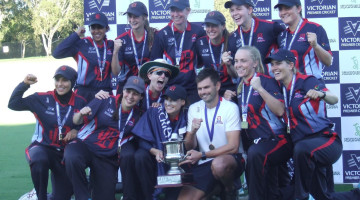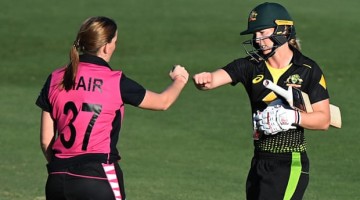‘First innings of the next Test is hugely important’: Kaushal Silva eyeing a Lord’s Test hundred
The dream of every cricketer is to score a hundred at Lord’s, but it is only a handful of lucky ones who get that opportunity to do so.
Amongst the Sri Lankans who have achieved that feat are Sidath Wettimuny, Duleep Mendis, Amal Silva, Mahela Jayawardene (twice), Marvan Atapattu, Tillakaratne Dilshan and Kumar Sangakkara.
Diminutive right-handed opening bat Kaushal Silva is no exception. He has his sights firmly set on scoring a hundred at cricket’s most hallowed grounds when Sri Lanka take on England in the third and final Test beginning on June 9.
“I’ve played four Tests in England now, scored three fifties but no hundred yet. I’m hoping to get set and go for the big one – to a hundred in the next,” said Silva who gained a lot of confidence from his knock of 60 in the second innings of the second Test at Durham.
“As a team we’ve finished this match off on a good note. Taking that mindset into the next game is important. Also, personally, I’m disappointed about the way I got out.”
The last occasion Silva played at Lord’s in 2014 he scored twin fifties (63 and 57) but he hopes to make it into three figures this time around.
It was Silva who set the tone for the Lankan batting revival at Durham with his patient knock that occupied 145 balls. Both he and his opening partner Dimuth Karunaratne were able to dent the England new ball bowlers Jimmy Anderson and Stuart Broad so that they were did not pose the same to the batsmen who followed.
“An opener’s role is especially important here, because our success has knock-on effects for the team,” said Silva.
“If Dimuth and I bat a good number of overs, the ball gets old and the others find it easier. Its England’s opening bowlers who are the real wicket-taking threats, and the pressure they apply is immense,” he said.
“In the last innings Dimuth and I batted 17 overs, and that made it easier for the rest of the team. If we can play like that, with positive intent, I think we can be successful.”
Following Silva’s half-century skipper Angelo Mathews scored an attractive 80, Dinesh Chandimal a magnificent 126 and Rangana Herath a plucky half-century that enabled Sri Lanka to total 475 and avoid the ignominy of successive innings defeats.
“We all knew we had it in us to bat like that – it’s just that we weren’t able to in the first three innings,” said Silva. “Now a few individuals have scored runs. They’ve got confidence. It’s only after you’ve done it a few times that it becomes easier for you. But we need to replicate that by training with that intensity, then taking it into the next match. The first innings of the next Test is hugely important, because that will set the tone for us.”
Explaining the effects it has on a bowler when you showing positive intent, Silva said, “If you attack any bowler, they will be put on the back foot by that. If you keep leaving the ball, these bowlers are so skillful that there is still a chance of getting out.
“Rotating the strike is crucial. When we score runs there is a little pressure on them as well. Here, the difference is that the good ball is what you should expect – that is what is normal. The skills of their bowlers are great. So to counter that, we have to try and bat positively.
“The other thing is to get them to bowl three or four over spells. With any fast bowler, if you have them bowling 15-20 overs, anyone will tire and drop their performances a bit. Among the seven batsmen we have we should be able to do that. Whoever is batting well that day should be able to bat through and ensure that happens.”
It was not so long ago that Silva who began his Test career promisingly with two centuries and eight half-centuries in his first 19 Tests lost his place following a poor run of scores against India and West Indies where he managed one fifty in nine innings. He was left out of the tour to New Zealand, but fought his way back into the team for the England tour with some heavy scoring in the domestic Premier league tournament.
“I knew that though I was dropped, I could find a way back into the team by scoring runs. I had only done poorly for one series. I believed that I could get back,” said Silva. “In the domestic tournament, I scored about 600 runs in four games – including two double centuries. If you score runs, you can have a place in the team.”
Silva said he did not do anything big to his batting to earn a recall but it was all to do with the mental aspect.
“When you look at first-class cricket and domestic cricket there’s a huge difference. The main reason is that bowlers at this level deliver a lot of very good balls. There are fewer loose balls and the bowlers are all good,” said Silva.
“As a batsman what you should try is to score runs off every scoring opportunity. There’s also a skill in identifying who is not bowling as well that day and scoring off him. The biggest adjustment is mental. It’s about being patient and waiting for the bad ball, and learning to see through tough periods.”
Silva was of the opinion that it was not the bowlers who were at fault but the batsmen for Sri Lanka being 0-2 down in the three-match series.
“Our bowlers have actually done well in the last two games. There were a few mistakes, but on the whole, they’ve been very good.”
“They didn’t get support from the batsmen,” said Silva. “We can’t aim too high, but if we can get to 300 or 250 at least, we can put some pressure on them, because our bowlers are doing well.”
He compared his team’s fielding to the batting and said, “I don’t think we are a terrible fielding side. Some days we field well and others we don’t. That happens with the batting as well. Consistency is what is missing.
“Maybe lack of anticipation is an issue. But we can’t have those excuses. If a bowler is doing well on a flat wicket and a catch gets dropped, that’s really tough on them. As a policy we don’t blame cricketers for dropping catches, because we all train hard. Anyone can miss a catch.”
Categories: Cricket



